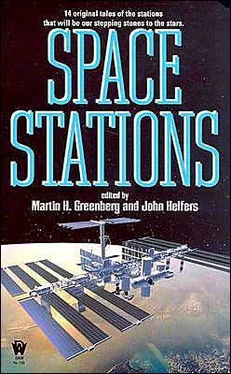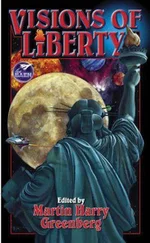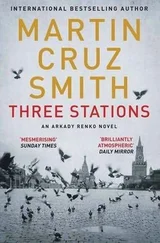Benjan turned. Stepped—the slow slide of falling, then catching himself, stepped—
You fall over Gray.
Skating down the steep banks of young clouds, searching, driving.
Luna you know as Gray, as all inStation know it, because pearly clouds deck high in its thick air. It had been gray long before, as well—the aged pewter of rock hard-hammered for billions of years by the relentless sun. Now its air was like soft slate, cloaking the greatest of human handiworks.
You raise a hand, gaze at it. So much could come from so small an instrument. You marvel. A small tool, five-fingered slab, working over great stretches of centuries. Seen against the canopy of your craft, it seems an unlikely tool to heft worlds with—
And the thought alone sends you plunging—
Luna was born small, too small.
So the sun had readily stripped it of its early shroud of gas. Luna came from the collision of a Mars-sized world into the primordial Earth. From that colossal crunch—how you wish you could have seen that!—spun a disk, and from that churn Luna condensed redly.
The heat of that birth stripped away the Moon’s water and gases, leaving it bare to the sun’s glower.
So amend that:
You steer a comet from the chilly freezer beyond Pluto, swing it around Jupiter, and smack it into the bleak fields of Mare Chrisium. In bits.
For a century, all hell breaks loose. You wait, patient in your Station. It is a craft of fractions: Luna is smaller, so needs less to build an atmosphere.
There was always some scrap of gas on the Moon—trapped from the solar wind, baked from its dust, perhaps even belched from the early, now long-dead volcanoes. When Apollo descended, bringing the first men, its tiny exhaust plume doubled the mass of the frail atmosphere.
Still, such a wan world could hold gases for tens of thousands of years; physics said so.
Its lesser gravity tugs at a mere sixth of Earth’s hefty grip. So, to begin, you sling inward a comet bearing a third the mass of all Earth’s ample air, a chunk of mountain-sized grimy ice.
Sol’s heat had robbed this world, but mother-massive Earth herself had slowly stolen away its spin. It became a submissive partner in a rigid gavotte, forever tide-locked with one face always smiling at its partner.
Here you use the iceteroid to double effect. By hooking the comet adroitly around Jupiter, in a reverse swingby, you loop it into an orbit opposite to the customary, docile way that worlds loop around the sun. Go opposite! Retro! Coming in on Luna, the iceball then has ten times the impact energy.
Mere days before it strikes, you blow it apart with meticulous brutality. Smashed to shards, chunks come gliding in all around Luna’s equator, small enough that they cannot muster momentum enough to splatter free of gravity’s grip. Huge cannonballs slam into gray rock, but at angles that prevent them from getting away again.
Earth admin was picky about this: no debris was to be flung free, to rain down as celestial buckshot on that favored world.
Within hours, Luna had air—of a crude sort. You mixed and salted and worked your chemical magics upon roiling clouds that sported forked lightning. Gravity’s grind provoked fevers, molecular riots.
More: as the pellets pelted down, Luna spun up. Its crust echoed with myriad slams and bangs. The old world creaked as it yielded, spinning faster from the hammering. From its lazy cycle of twenty-eight days it sped up to sixty hours—close enough to Earthlike, as they say, for government work. A day still lazy enough.
Even here, you orchestrated a nuanced performance, coaxed from dynamics. Luna’s axial tilt had been a dull zero. Dutifully it had spun at right angles to the orbital plane of the Solar System, robbed it of summers and winters.
But you wanted otherwise. Angled just so, the incoming ice nuggets tilted the poles.
From such simple mechanics you conjured seasons. And as the gases cooled, icy caps crowned your work.
You were democratic, at first: allowing both water and carbon dioxide, with smidgens of methane and ammonia. Here you called upon the appetites of bacteria, sprites you sowed as soon as the winds calmed after bombardment. They basked in sunlight, broke up the methane. The greenhouse blanket quickly warmed the old gray rocks, coveting the heat from the infalls, and soon algae covered them.
You watched with pride as the first rain fell. For centuries the dark plains had carried humanity’s imposed, watery names: Tranquility, Serenity, Crises, Clouds, Storms. Now these lowlands of aged lava caught the rains and made muds and fattened into ponds, lakes, true seas. You made the ancient names come true.
Through your servant machines, you marched across these suddenly murky lands, bristling with an earned arrogance. They—yourself!—plowed and dug, sampled and salted. Through their eyes and tongues and ears you sat in your high Station and heard the sad baby sigh of the first winds awakening.
The Station was becoming more than a bristling canister of metal by then. Its agents grew, as did you.
You smiled down upon the gathering Gray with your quartz eyes and microwave antennae. For you knew what was coming. A mere sidewise glance at rich Earth told you what to expect. Like Earth’s tropics now, at Luna’s equator heat drove moist gases aloft.
Cooler gas flowed from the poles to fill in. The high wet clouds skated poleward, cooled—and rained down riches.
On Earth, such currents are robbed of their water about a third of the way to the poles, and so descend, their dry rasp making a worldwide belt of deserts. Not so on Luna.
You had judged the streams of newborn air rightly. Thicker airs than Earth’s took longer to exhaust, and so did not fall until they reached the poles. Thus the new world had no chains of deserts, and one simple circulating air cell ground away in each hemisphere.
Moisture worked its magics.
You smiled to see your labors come right. Though anchored in your mammoth Station, you felt the first pinpricks of awareness in the crawlers, flyers, and diggers who probed the freshening Moon.
You tasted their flavors, the brimming possibilities. Northerly winds swept the upper half of the globe, bearing poleward, then swerving toward the west to make the occasional mild tornado. (Not all weather should be boring.)
Clouds patrolled the air, still fretting over their uneasy births. Day and night came in their slow rhythm, stirring the biological lab that worked below. You sometimes took a moment from running all this, just to watch.
Lunascapes. Great Grayworld.
Where day yielded to dark, valleys sank into smoldering blackness. Already a chain of snowy peaks shone where they caught the sun’s dimming rays, and lit the plains with slanting colors like live coals. Sharp mountains cleaved the cloud banks, leaving a wake like that of a huge ship. At the fat equator, straining still to adjust to the new spin, tropical thunderheads glowered, lit by orange lightning that seemed to be looking for a way to spark life among the drifting molecules.
All that you did, in a mere decade. You had made “the lesser light that rules the night”
now shine five times brighter, casting sharp shadows on Earth. Sun rays glinted by day from the young oceans, dazzling the eyes on Earth. And the mother world itself reflected in those muddy seas, so that when the alignment was right, people on Earth’s night side gazed up into their own mirrored selves. Viewed at just the right angle, Earth’s image was rimmed with ruddy sunlight, refracting through Earth’s air.
You knew it could not last, but were pleased to find the new air stick around. It would bleed away in ten thousand years, but by that time other measures could come into play.
You had plans for a monolayer membrane to cap your work, resting atop the whole atmosphere, the largest balloon ever conceived.
Читать дальше












